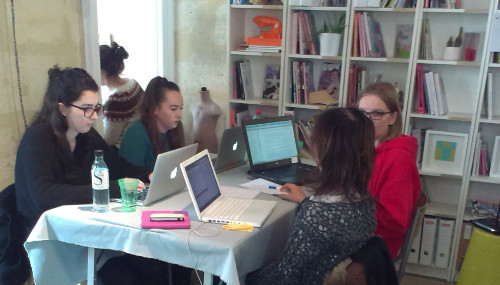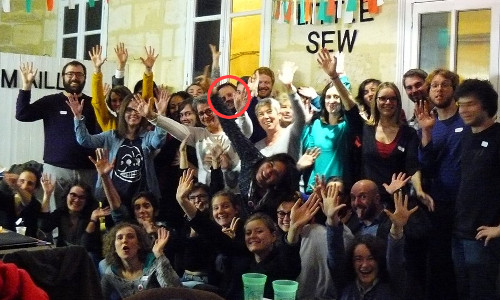
In video compression there is a concept known as the keyframe. The simplest way to store a video recording is to store each frame (let's say it's 25 frames per second) as an image, all together in one big file. But people noticed that when progressing from frame to frame most of the image of a frame does not change between frames. That makes sense, otherwise the whole screen would flash constantly. The new model of storing video was to store frame 1 in its entirety, and then for frame 2, frame 3 and onwards you would only store what changed from the previous frame.
This gives enormous gains in terms of filesize and all common video formats use it. But we don't always view video from frame 1 right up until the end. Sometimes we want to seek backwards and forwards. If we only had one frame in its entirety and then a long sequence of frame changes it would be very expensive (and therefore slow) to calculate what frame 37500 at the 25 minute mark should look like.
That's why we also have keyframes. A keyframe is simply a frame that is stored in its entirety (like frame 1), which occurs at certain moments in the video. For instance, once every minute (every 1500 frames) we store the whole frame, and in between keyframes we only store changes or "deltas".
As it happens, keyframes also have a second purpose as an error correction mechanism. If you ever try to play back a video and all you see is the whole screen full of weird purple rectangles with something moving here and there, that's because the video player is applying changes frame by frame, to a keyframe which is damaged. So all you see is the changes, but not the original image from which the changes have been calculated. And thus it looks like the video is broken. But if you wait long enough, you might reach a keyframe. And once you have a keyframe you have the whole image again, and calculating changes from that image makes the video "work" again.1 So if some of the keyframes are missing or damaged it breaks part of the video, but not all of it. Keyframes are a mechanism to recover from a partially damaged video file.
We can even view a keyframe as a metaphor in life. A keyframe is a point where we have excellent clarity - we feel we know exactly what we need to keep doing, what we need to stop doing, what we need to start doing. But then the moment passes, we chug along, and after a while it's not all that easy to measure exactly how much progress we've made, or whether we're headed in the right direction. Not until the next moment of clarity. The next keyframe, if you will.
---
I'm heading home from Django Girls Bordeaux and as I'm sitting on the plane I realize I'm incredibly at peace with the world today. Nothing seems to bother me at all. As if I've just nourished myself on the exact right diet that my body needed. Even physiologically speaking - over the last two days I've lived on less food and less sleep than normal. Yet my body kept saying: that's all we need. Like an engine running on the perfect fuel, at peak performance.
I've coached at Django Girls once before, but this time was even better. As "meta coach" my mission was to supplement the coaches - one per team - by helping the participants whose coach was busy, or by helping with obscure problems. In practice I ended up more like a doctor doing rounds - I would quite systematically visit each team and help anyone who needed assistance. This was super awesome, since I had a chance to talk to all the participants and all the coaches.

At its core Django Girls is a really simple idea. We invite a group of women and teach them some basic programming and web development. Big deal, right? But think about the last time you learned some basic programming... What did that lead to? A career in software by any chance? A life long interest in programming perhaps? So you see, it *is* a big deal. It's actually one of the bigger deals out there.
Let me illustrate why.
On Friday night we had a drinks event for the coaches. It was basically like any group of programmers drinking beer and talking shop, with splinters of pip, pypi mirrors, wheels and devpi flying everywhere (mercifully, a critique on the state of python packaging was omitted). For me it was doubly interesting, since that's literally the first time I've ever talked about programming in French.2 But I've heard a version of that conversation any number of times, and basically it's a group of coders making fun of and complaining about stuff all night long, albeit in an entertaining manner.3 This is our culture, people. Oh and I forgot to mention that 9 of 10 coaches were male. (But that's irrelevant, right?) End of scene.
Saturday rolls around, it's the big day. The room fills with 27 participants and their coaches. Everyone's ready to roll. The participants are a little shell shocked at first, not surprisingly. How would you feel if you had to type cryptic stuff in a terminal window? But quite soon everyone is humming along nicely. The coaches aren't talking amongst themselves now, they're with their teams. And each one is doing a fantastic job. (I saw the whole thing, remember? I was walking around.) They're being supportive. They're enthusiastic. They explain things patiently. They help the participants relax and understand that they're on the right track.
Let me repeat that in case you got distracted for a second. The *participants* are making the *coaches* better. They're making *us* think and feel more positive and have more fun than usual.
And the participants? Well, where do I start? When is the last time you had the courage and the patience to spend 9 hours learning something new? Something that many people think "isn't for people like yourself"? Right, chew on that one for a minute. You see, Django Girls isn't like being in school where you mindlessly sit through one class after another. The people who participate are motivated to learn. They work through a tutorial that, despite having been written for beginners, is full of technical terms they've never heard before.4 They're expected to learn mostly through reading and performing exercises. They're expected to absorb a lot of knowledge throughout the day. They're expected to show a lot of patience and perseverance. And boy do they ever. Not only that, they are some of the nicest and most fun people you could ever spend a day with.

So you see, it's not that we're doing them a favor because one can have a nice career in IT these days. You don't have to work in IT to have an awesome career, there are many other options. "We" need "them" much more than "they" need "us".5
They are beginners. That sounds like a bad thing, but it's actually an awesome thing. They didn't come up through our computer science programs. They didn't cut their teeth on PHP back when it was just C macros.6 They come from a different background, with a different mindset, and a fresh perspective. They're not jaded like us, joking around about how broken software is. And we, the coaches, are seeing it through their eyes. Why is coaching at Django Girls so fulfilling? Because wow, that's what programming is *supposed* to be like!
Some highlights that stuck in my mind:
And that, to make a long story short, is why someone who's been a programmer for 20 years is raving about how incredible it is to coach at Django Girls. A moment where everything comes together and everything is awesome. A keyframe moment that reminds me that *this* is what I want my life to be about.

What are the keyframe moments of your life?
---